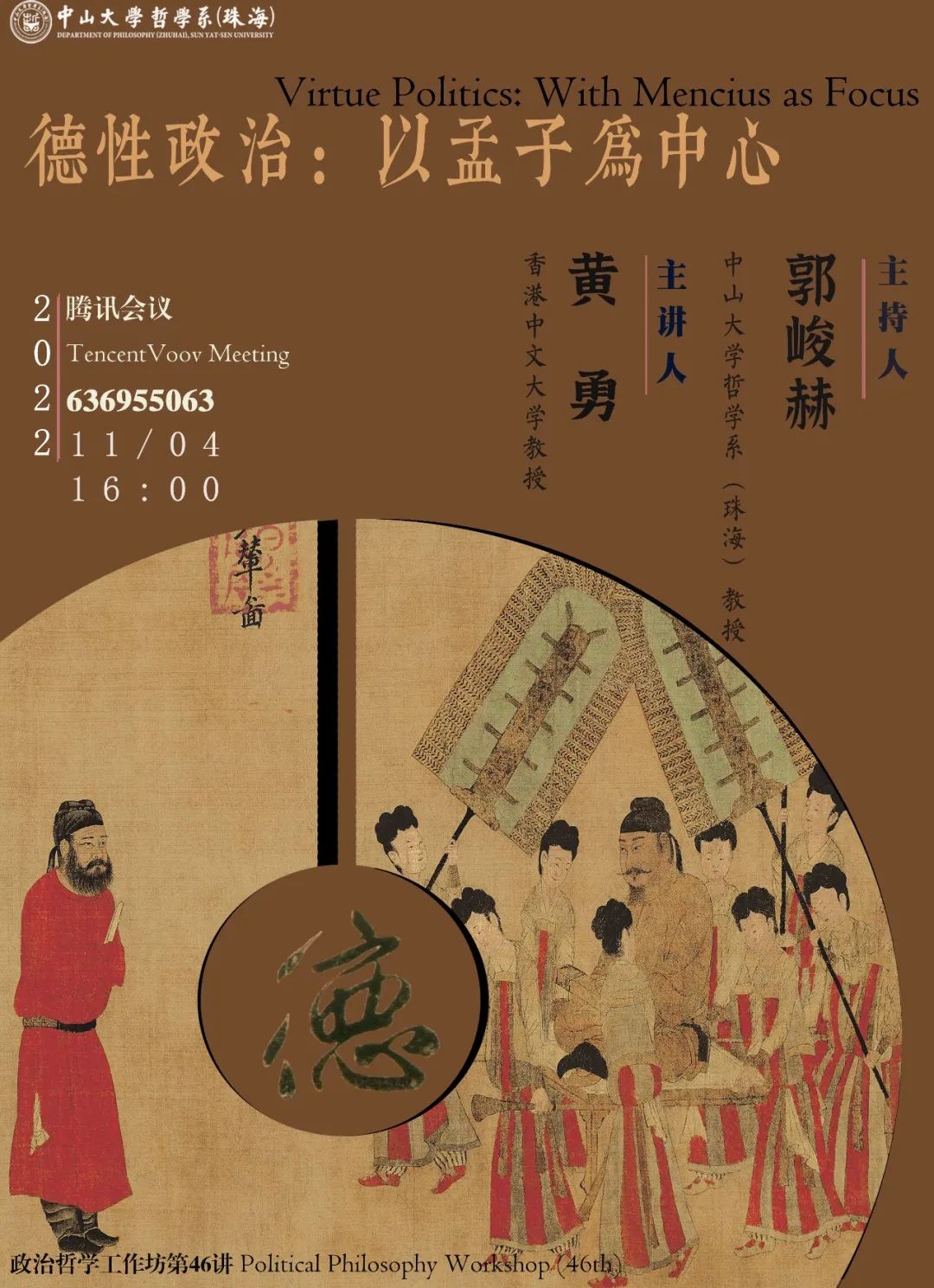政治哲学工作坊第四十六讲:德性政治:以孟子为中心
德性政治:以孟子为中心

Political Philosophy Workshop (46th)
Organizer:
Department of Philosophy (Zhuhai),Sun Yat-sen University
Topic:
Virtue Politics:
With Mencius as Focus
Speaker:
Yong HUANG
Professor, the Chinese University of Hong Kong
Moderator:
Jun-Hyeok KWAK
Professor, Department of Philosophy (Zhuhai), Sun Yat-sen University
Time:
November 4th 2022 16:00
VooV Meeting ID:
636-955-063
ABSTRACT:
It has been widely observed that virtue ethics, regarded as an ethics of the ancient, in contrast to deontology and consequentialism, seen as an ethics of the modern, is experiencing an impressive revival and is becoming a strong rival to utilitarianism and deontology in the English-speaking world in the last a few decades. Despite this, it has been perceived as having an obvious weakness in comparison with its two major rivals. While both utilitarianism and deontology can at the same time serve as an ethical theory, providing guidance for individual persons and a political philosophy, offering ways to structure social institutions, virtue ethics, as it is concerned with character traits of individual persons, seems to be ill-equipped to be politically useful. In recent years, some attempts have been made to develop the so-called virtue politics, but most of them, including my own, are limited to arguing for the perfectionist view that the state has the obligation to do things to help its members develop their virtues, and so the focus is still on the character traits of individual persons. However important those attempts are, such a notion of virtue politics is clearly too narrow, unless one thinks that the only job the state is supposed to do is to cultivate its people’s virtues. Yet obviously the government has many other jobs to do such as making laws and social policies, many if not most of which are not for the purpose of making people virtuous. The question is then in what sense such laws and social policies are moral in general and just in particular. Utilitarianism and deontology have their ready answers in the light of utility or moral principles respectively. Can virtue ethics provide its own answer? This paper attempts to argue for an affirmative answer to this question from the Confucian point of view, as represented by Mencius. It does so with a focus on the virtue of justice, as it is a central concept in both virtue ethics and political philosophy.
政治哲学工作坊第四十六讲
主办:
中山大学哲学系(珠海)
主题:
德性政治:以孟子为中心
主讲:
黄勇
香港中文大学 教授
主持:
郭峻赫
中山大学哲学系(珠海)教授
时间:
2022年11月4日16:00开始
地点:
腾讯会议ID:636-955-063
摘要:
众所周知,与被视为现代伦理学的义务论和后果主义形成鲜明对比的,被视为古代伦理学的美德伦理学正在经历一场令人印象深刻的复兴,并在过去几十年的英语世界中成为功利主义和义务论的有力竞争对手。尽管如此,与两个主要竞争对手相比,美德伦理学被认为具有明显的缺点。功利主义和义务论都能作为一种伦理理论,为个人和政治哲学提供指导,为构建社会制度提供方法。然而,关注个人品格的美德伦理学似乎在政治上用处不大。近年来,一些人试图发展所谓的德性政治,但大多数人,包括我自己,仍局限于最理想的讨论,即国家有义务帮助其成员培养美德,其重点仍是个人品格。虽然这些讨论很重要,但这种德性政治的概念显然过于狭隘,除非人们认为国家唯一需要做的工作就是培养人民的美德。然而,政府显然还有许多其他工作要做,例如制定法律和社会政策,其中的许多(如果不是绝大多数的话)并不是为了使人们有德性。那么问题就在于,这些法律和社会政策在何种意义上是总体道德的,并在特定情境中是公正的。功利主义和义务论分别根据功利原则和道德原则为这些问题提供了答案。美德伦理学可以提供自己的答案吗?本讲试图从以孟子为代表的儒家理论着手,来论证美德伦理学可以为上述问题提供自己的答案。本讲将重点关注公正德性,因为它是美德伦理学和政治哲学的核心概念。
来源|哲珠新媒体
文稿|赖秋霞
编辑|赵心雨
初审|黄丹萍
审核|卢 毅
审核发布|屈琼斐


